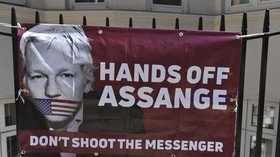UN experts call for Assange's unconditional release as he loses last appeal over restrictive rules
A UN-endorsed team of experts has urged London to "immediately" allow WikiLeaks co-founder Julian Assange to leave the Ecuadorian Embassy, as the court of last resort denied his appeal over a newly imposed set of 'censure' rules.
Seong-Phil Hong, chair-rapporteur of the Working Group on Arbitrary Detention, and Michel Forst, special rapporteur on the situation of human rights defenders, reiterated calls for the UK to abide by international law and allow Assange to leave the Ecuadorian Embassy without any precondition.
Also on rt.com Assange sues Ecuador for ‘violating fundamental rights & freedoms’ over new set of ‘censure’ rules"It is time that Mr Assange, who has already paid a high price for peacefully exercising his rights to freedom of opinion, expression and information, and to promote the right to truth in the public interest, recovers his freedom," the UN experts demanded in a statement on Friday.
The experts argued that "pre-trial detention must be only imposed in limited instances," adding that the charges Assange faces in the UK for skipping his bail while applying for asylum cannot justify his six years within the embassy's walls.
Assange became holed up in the Ecuadorian Embassy in London in 2012 after being granted asylum by then-Ecuadorian president Rafael Correa. Assange, who was in the UK at the time, was unable to go to the airport for fear of being arrested and handed over to the US, where he is wanted for exposing diplomatic and military secrets, and has had to stay in the embassy since.
Back in February 2016, the UN working panel found that Assange, who then still faced extradition to Sweden over a rape investigation, was "arbitrarily detained" and must be set free. London called the demand "ridiculous." Sweden dropped its case against Assange more than a year ago.
Despite the UN experts' support, Assange suffered a setback with the Ecuadorian justice system. On Friday, Pichincha Provincial Court reaffirmed a decision by a lower court to throw out his appeal against a new set of house rules. The rules laid out in a special protocol in October restricted Assange's visitation rights, made him refrain from political statements, pay his own medical bills, and take better care of his cat. Shortly after the regulation was imposed, Assange gave the cat away, with reports circulating that he has become virtually isolated in the embassy after all the staff he had personally known left.
Speaking before the court via a video-link last week, Assange warned that the new rules would "inevitably lead to a health crisis for me, resulting in my death or hospitalization or a political excuse to illegally hand me over to the British, and therefore to the United States, where I face a potential life sentence."
In late October, a judge rejected his request to change the protocol, arguing that the government has the right to impose any rules it wants inside the premises.
Assange's lawyer Carlos Poveda admitted that the whistleblower is stuck with the rules since all legal options to revise them have been "exhausted."
Think your friends would be interested? Share this story!















